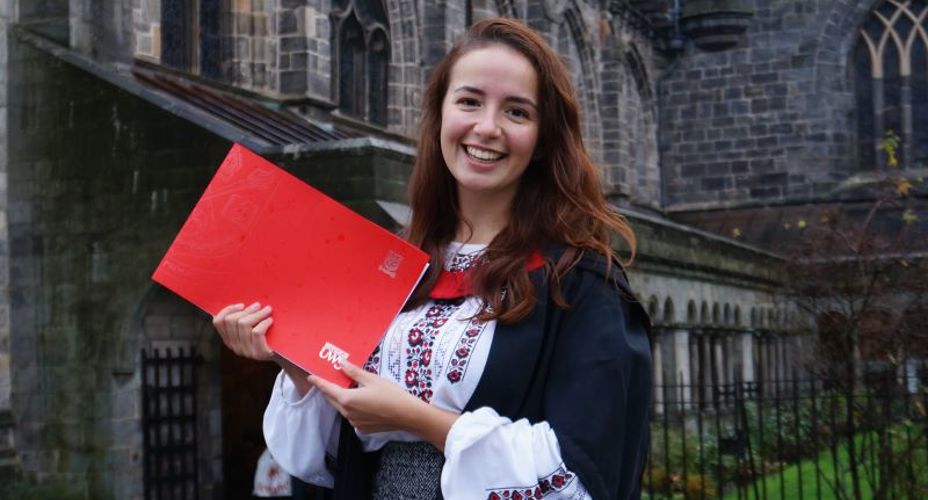Sunday 14 07 2024

A Ukrainian refugee has received a commendation from the British Council in this year's English Language Teaching Master's Dissertation awards.
Valeriia Shumeiko graduated with distinction from the University of West of Scotland 2022-2023 MEd TESOL programme. Valeriia, from the village of Stari Petrivtsi in Kyiv Region, Ukraine moved to Scotland in August 2022, after the full-scale Russian invasion, and currently lives in Barrhead.
Valeriia’s dissertation, Language Ideologies and Investment in English Learning: The Case of Ukrainian Refugees in Scotland was praised for its exploration of how language ideologies shape people’s investment and identities in language learning, with findings that are relevant to policymakers and teachers working with any disempowered groups.
“As I am a Ukrainian refugee residing in Scotland, I’m interested in the role that language has played in other Ukrainians’ journeys and their adaptation to a new country."Valeriia Shumeiko, UWS graduate
Valeriia said, “Through talking to other Ukrainians living in Scotland, I encountered many opinions that stem from dominant ideologies about the superiority of British English speakers.
“One family told me that they were hoping to master the ‘British’ accent in Scotland, which was Received Pronunciation. This was the accent we were exposed to in English language course books in Ukraine. However, little did they know that Scottish English had little to do with the standard British accent they had expected to pick up here, which was sometimes demotivating.
“As a teacher, I realised that when students enter a classroom, their progress depends on factors that lie beyond the teacher’s expertise and curriculum. Students bring in ideologies and beliefs that can also play a part, such as a preference for ‘Standard English’, or a belief that English can provide access to social mobility.
“I hope that the findings of the study will be beneficial for ESOL teachers in Scotland and the UK who seek to improve refugees’ experience of learning and using English. Moreover, raising refugee learners’ awareness about possibly harmful language ideologies and providing further suggestions on how to eliminate their negative influence, can assist refugees’ smooth adjustment to a new country and empower them as non-native users of English.
“This research has also helped me better understand the language process I was going through myself. Before arriving in Scotland, I disregarded the tremendous effort I made to learn a language to speak fluently and focused on whether ‘real English users’ would notice my imperfections. However, I realized that this fear is rooted in the ideology of native speakers’ linguistic superiority, and in reality, they focus on my ideas rather than faulty sentences.
“As a result, whenever I talk to a Ukrainian living abroad who has insecurities about learning another language, I share the findings of my research to show how misleading our beliefs can be and encourage them to look at their situation from a new perspective.”
Valeriia was supervised by Dr Katy Highet, a lecturer at UWS, who said, “At UWS we pride ourselves on both the high quality of our research and the inclusive nature of our organisation. Valeriia is a prime example of both of those principles and the fantastic achievements our students are capable of.”
“I’m incredibly proud of what Valeriia has achieved. Her findings will hopefully help make it easier for other people who arrive from Ukraine, or elsewhere, as they begin to learn English."Dr Katy Highet, UWS lecturer